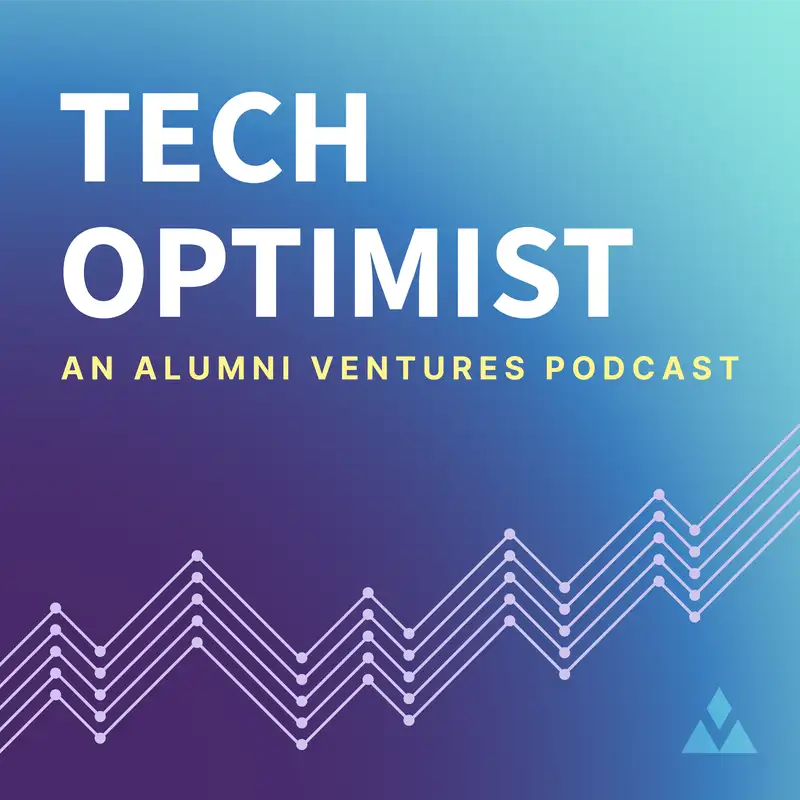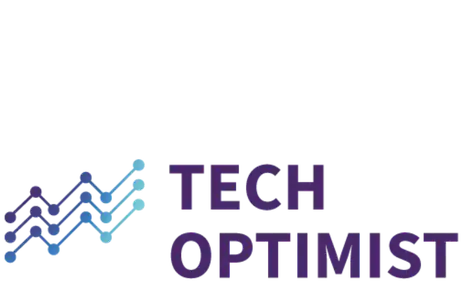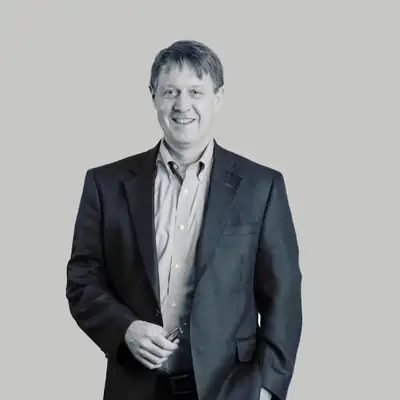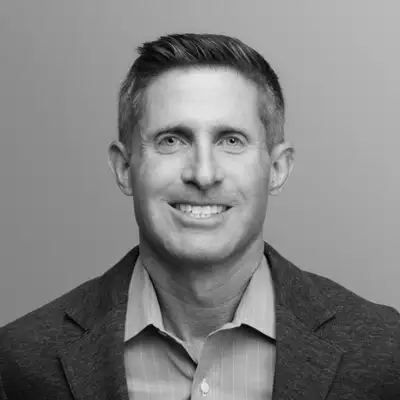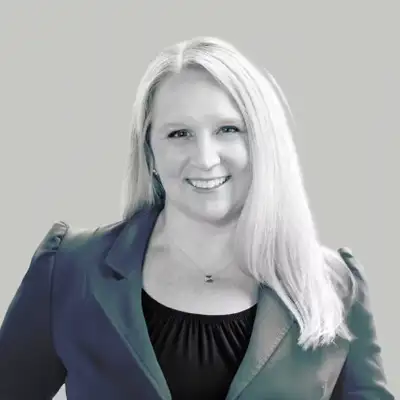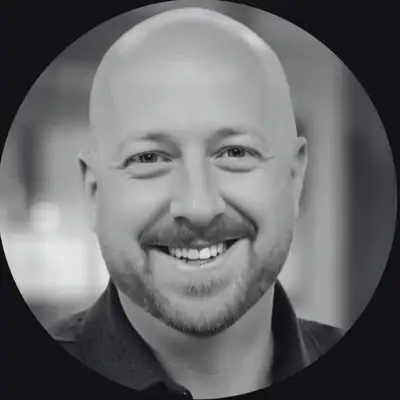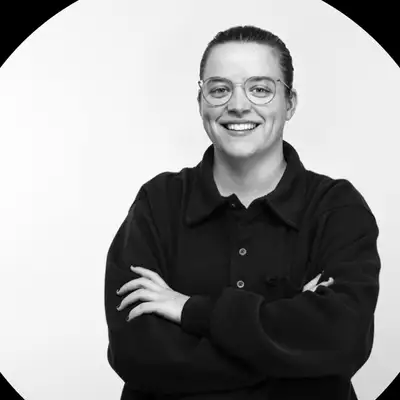#85 - Meet the Startup Turning Employee Departures Into Brand-Building Opportunities
Samantha Herrick:
Welcome to the Tech Optimist where innovation meets possibility. I'm Samantha Herrick, your host here to guide you through the stories shaping tomorrow's world. Every week we dive into bold ideas and extraordinary people who dare to reimagine what's possible. Today we'll uncover a story that's not just about technology, but about resilience, transformation and purpose. This company helps you tackle the if and when. It's a journey of disruption, ambition, and hope, and I promise it'll leave you inspired. Let's get started.
Andrew Hamilton:
We're ultimately providing support at the end of the employee life cycle that has kind of been a forgotten landscape.
Samantha Herrick:
That is Andy Hamilton, co-founder and CEO of When.
Andrew Hamilton:
And our promise is last impressions are lasting impressions. So, we want to make sure that we treat people on the way out the same way we treat them on the way in.
Mike Collins:
There's a dynamic economy, people are moving, and so...
Samantha Herrick:
Come on. I don't have to tell you who that is. That's Mike Collins, founder and CEO at Alumni Ventures.
Mike Collins:
It's a little bit like death and taxes, I feel really good about when there will always be a place in the market. One of the reasons I think we were excited to be an investor is this is a market that's always going to exist.
Samantha Herrick:
And you know me, I think, at this point. My name is Samantha Herrick, your producer and host. My goal is to bring you closer to the visionaries shaping tomorrow's world. As a storyteller, I thrive on uncovering the human side of technology. I've spent my time with this podcast connecting ideas with people, turning complex concepts into engaging stories, and whether it's the latest startup revolution [inaudible 00:01:47] industries or breakthroughs redefining how we live and work, I'm here to explore it all with and for you. So let's dive into the future together.
Welcome back to the Tech Optimist everyone, where we explore the bold ideas and brilliant minds shaping the future. I'm your host, as I had mentioned earlier, Samantha Herrick, and today we're stepping into a topic that often hides in the shadows of the employee life cycle, offboarding. Now, let's face it, endings are hard, especially in the workplace. But what if there was a way to turn those transitions into seamless, even empowering experiences for everyone involved, both parties? That's exactly what When, a Chicago based startup is making possible, led by CEO, Andy Hamilton and fresh off raising $4.6 million in seed funding, When specializes in managing the tricky terrain of employee offboarding. Their mission is simple yet profound, to ensure that benefits transition smoothly while leaving a positive legacy for departing employees and companies alike.
Offboarding isn't just a box to check, it's a chance to protect your brand, nurture relationships. Today we're going to uncover how When is reshaping this often overlooked process into a strategic advantage. Ready to rethink how endings could lead to new beginnings? Let's dive in.
Speaker 4:
In today's volatile job market employee turnover is skyrocketing.
Samantha Herrick:
This is a quick sales video done by the When team.
Speaker 4:
And it's costing companies more than just money. Layoffs and departures are tarnishing reputations, crushing morale, and overwhelming HR teams. For exiting employees the transition is daunting, especially when it comes to maintaining health coverage during this challenging time. At the core of this problem is COBRA, an outdated and inflexible system that fails to meet the needs of modern employees, leaving them with expensive, confusing, and inadequate options.
But what if there was a better way? A way to support your employees through one of life's most stressful transitions? Say hello to When, redefining off-boarding, elevating the exit experience, and reducing COBRA expenses. When's AI-powered platform and user-friendly interface provide personalized guidance, empowering employees to make informed decisions about their health insurance options.
In addition to health insurance, When's comprehensive platform offers a wide range of resources and information, including help with 401k rollovers, career guidance, financial assistance, and more. For HR teams, When is a valuable partner in the exit process. When streamlines the transition process, provides extensive support to exiting employees, reduces costs and risks, alleviates the administrative burden on HR professionals, allowing them to focus on core tasks and initiatives.
Don't let exits undermine your values. Be ready for when it matters most, and show your employees that you're there for them every step of the way. When, because last impressions are lasting impressions. Learn more at forwhen.com.
Samantha Herrick:
First, we've got an ad and a disclaimer. Don't go anywhere.
Speaker 5:
Exceptional value creation comes from solving hard things. Alumni Ventures Deep Tech Fund is a portfolio of 20 to 30 ventures run by exceptional teams who are tackling huge opportunities in AI, space, energy, transportation, cyber security, and more. These game-changing ventures have strong lead venture investors and practical approaches to creating shareholder value. If you are interested in investing in the future of Deep Tech, visit av.vc/deeptech to learn more.
Samantha Herrick:
As a reminder, the Tech Optimist podcast is for the informational purposes only. It's not personalized advice and it's not an offer to buy or sell securities. For additional important details, please see the text description accompanying this episode.
Mike Collins:
Hi everybody, it's Mike Collins. I'm the founder and CEO of Alumni Ventures. I'm here with one of our portfolio companies today and the founder, Andy Hamilton, of a company called When. Welcome to the show, Andy.
Andrew Hamilton:
Thanks for having me, Mike. Excited to be here.
Mike Collins:
All right, so let's just hop right in. What's the elevator pitch for When? What do you guys do? What are you all about?
Andrew Hamilton:
Yeah, so we're pretty unique. We are an off-boarding solution, and we partner with employers to help in the exit of employees, voluntary and involuntary. And our mission is really to help employees in that job transition, to make sure that they have a soft landing. We're ultimately providing support at the end of the employee life cycle that has kind of been a forgotten landscape. And for employees we're here to be that support, but we're also providing a technology platform that makes it really easy for them to find health insurance alternatives to COBRA.
And then we partner with Morgan Stanley and other companies to help with everything from 401k rollover, career development, out placement, [inaudible 00:07:57] job search. And then for our clients, for employers, we're here to protect their brand, the reputation by making sure we take care of people as they're exiting, best in class service when somebody's leaving. And our promise is last impressions are lasting impressions, so we want to make sure that we treat people on the way out the same way we treat them on the way in.
And the return is we're going to move a lot of the risk that COBRA participants typically bring to an employer's health insurance plan. We're going to move it away to the ACA, as we help enable people to find their own health insurance that they can afford during a job transition.
Mike Collins:
No, and again, our audience is a lot of entrepreneurial folks, and this is just the nature of the world, and a lot more energy goes into recruiting and onboarding and the honeymoon period. And their equal weight and equal attention should be part of the other part of the journey, which is we all move on to other things at some point. And I couldn't agree with you more, Andy, last impressions from both parties standpoint, in sometimes a planned, sometimes an unplanned, but often a stressful, uncomfortable situation for both parties where, with a little bit of work, a little bit of technology, a little bit of attention, a little bit of empathy, it can be a lot better.
Andrew Hamilton:
Absolutely and it should be. And this was born, for many entrepreneurs listening, this was born out of personal experience. Me and my fellow co-founder Dan Wertheimer, we went through rifts. My last company was acquired by Expedia Group, and I worked there for a couple of years post-acquisitions, and then COVID hit, ended up closing down my division during COVID. And that's where I experienced the void in solutions when you hit the end of the employee life cycle. Everything we had during onboarding and open enrollments and all the point solutions available just kind of evaporate.
And then Dan went through a similar experience as well. And these are large companies that really care about their employees. And it's like you said at the beginning, there's so much effort, so much innovation around those initial engagements, whether it's recruiting solutions, onboarding or open enrollment, and employers have been neglected from the lack of solutions to help them in the offboarding process, and that's really what we aim to bring to the table, to help companies do it better.
Mike Collins:
So Andy, relatively new company. Where you are in your life cycle and journey?
Andrew Hamilton:
Yeah, so we're early stage. We started down this path around four years ago, four and a half years ago, and it was just an idea. My background is prop tech, was not HR tech, so I had to learn the HR space and benefit space, and we got to work in understanding what the problems and pain points were for employers and employees. We really officially launched this year with our first paying clients. Started with client one in that first week of January, and now today we have over 2000 clients, ranging in size from a couple hundred employees to thousands of employees.
And I think by January we're going to have close to 550,000 employees on our platform.
Mike Collins:
[inaudible 00:11:46].
Andrew Hamilton:
So, we've had a great curve this year. It's exciting because we know what we're doing is really impactful to employees.
Mike Collins:
Just taking a couple of steps back, what are the headwinds and what are the tailwinds behind a company like yours, in just the environment in general?
Andrew Hamilton:
Yeah. So, it's interesting. Probably the biggest headwind we face is there's nobody else doing really what we're doing. And you would think that's a great tailwind, but it actually works conversely. We're the only ones getting the message out there. We're the only solution. And as a startup, we don't have resources to be doing Super Bowl ads, so it takes a while for us to educate companies.
That's our hardest headwinds, going against the status quo, and the lack of talk around this, but I think we're doing a good job chipping away at that. The tailwind for us is the unfortunate economy. Things aren't changing, companies are going to continue to go through layoffs, they're going to continue to have restructuring. AI is going to continue to have an impact on the types of jobs that are available or being eliminated, going forward. And then it's mixed with just the younger generation, they don't stay at jobs the same amount of time that I stayed, or my parents stayed.
Mike Collins:
Sure.
Andrew Hamilton:
They're not here for the long haul. So turnover rates have declined rapidly from generation to generation. And I think for Gen-D, the average tenure is about 2.3 years. So, whether it's voluntary, involuntary turnover, companies have to start thinking about that transition process, because as we've seen with the younger generation too, they're vocal and if it doesn't go well they're recording that exit interview, they're going to let people know on LinkedIn or Glassdoor or TikTok or Instagram. So, we got to get it right.
Mike Collins:
Yeah, we've seen some examples of really just horrific handling of situations, for sure.
Andrew Hamilton:
Yeah.
Mike Collins:
And again, like you said, it's like obviously there's recessions and industries go up, industries go down, there's rifts, there's layoffs, but even in industries that are doing really well, there can be changes in who's winning, who's losing.
Samantha Herrick:
All right, now let's dive into a topic that's transforming workplaces everywhere, employee turnover. The numbers paint a very revealing picture.
In 2023, the average annual turnover rate across the US and its industries was 41%, with voluntary departures accounting for a striking 70%. According to BuiltIn over four million workers leave their jobs every month, roughly 2.5% of the workforce. Industries like leisure and hospitality topped the charts with a 79% turnover rate, while government jobs the lowest at just 18%.
Now, what's driving these shifts? Gallup reports that highly engaged employees can reduce turnover by 18%, but for businesses failing to engage, the costs are steep. Replacing frontline workers can eat up 40% of their salary, while for leaders the price can skyrocket to 200%. Looking forward, Gallup also found that 51% of employees are already exploring new opportunities, signaling even more movement ahead. Small and mid-sized businesses feel the pinch harder, with turnover averaging at 12%, compared to 9.9% for larger enterprises, according to LinkedIn.
Understanding these trends isn't just about numbers, it's about adapting to a future where employee offboarding and retention strategies matter more than ever. This is where When comes in and why we feel they're such an important company to have a spotlight like this as their own episode on the Tech Optimist podcast. So, stick around as we explore more innovative solutions With Andy and Mike.
Mike Collins:
In a real hot market, people are switching jobs for different reasons. There's a dynamic economy, people are moving, and so it's a little bit like death and taxes. I feel really good about When, there will always be a place in the market. One of the reasons I think we were excited to be an investor is this is a market that's always going to exist.
Andrew Hamilton:
Correct. Yeah. So, inevitable part of [inaudible 00:16:25] life cycle, there is always an ending to a job.
Mike Collins:
For sure. And so, talk to me a little bit about if you had an ask of our, probably the hundreds and hundreds of people that through one of our funds are now an owner of When, and our community and other co-founders, how can we help?
Andrew Hamilton:
Love it. So, most importantly to us is just talking to more employers. For us, ideal customer profile is somebody that's self-insured, typically a thousand or more employees, but we certainly deal with less. And where they do want to focus on offboarding and they understand the risk that comes from COBRA participation.
So, opening doors to those clients, making introductions, we welcome it. We tend to talk to the HR leaders, whether it's a CHRO or director of total rewards. But then also on the finance side, CFOs, director of finance, if you have a risk team, they certainly understand the value that we bring to the organization.
And then we're always looking for partners, and that could be partner for our marketplace, where we want to serve employees the types of solutions that they need during a job transition. Like today, we have partners around job search and career development and 401k rollover, but there's plenty more opportunities and we can be pretty creative with how we present those solutions to employees to open those doors.
And then there's sales partnership. So, if any listeners there have good relations or happen to be a broker, we certainly like to partner with brokers in bringing our solution to employers.
Samantha Herrick:
Think you could help out When or want to connect? Visit them at www.forwhen.com. Www dot F-O-R_W-H-E-N dot com. Or connect with them on LinkedIn.
Mike Collins:
Great. Yeah, and we'll be sure you get some information in the show notes and the links there to have people reach out to you. But you're in the space, and again a lot of our listeners are entrepreneurs or executives. Just what are three or four key takeaways when you're on the giving end of this situation? Any thoughts or advice for CEOs?
Andrew Hamilton:
Yeah, from an entrepreneurial standpoint, this is my third startup and I've been fortunate to have success with the prior two. And knock on wood, I hope with this one as well. I like to say when people ask, what is the hardest part of getting things rolling? In my opinion, it's really around the pitch deck.
Pitch deck is key, not just for getting investment and raising capital, but it really, if you spend the time on it, helps you understand the story and it helps you formulate your go-to-market plan as well. And it's often overlooked, or people stress out about it and don't realize its true impact. But I found one, it's hard, takes a long time to get it right, a lot of iterations. But if you do it well, it certainly helps for investors to understand the story, but also internally it helps you understand how to give an elevator pitch, how to communicate your message that resonates in the sales process.
Mike Collins:
It comes to storytelling, right? And I do think that the great entrepreneurs, that's part of understanding that you have to... It is sales. Not only customers, but employees, people with capital, being an entrepreneur is a sales job where you spend half of your time in the first years raising money, and the other half building a business.
And just being able to tell your story and your vision to all the stakeholders is just so essential. And like you, Andy, I've just found writing is a really powerful way to think, clarify your thoughts, practice, iterate, evolve. I remember in jobs and startups that I've done is after every meeting I'd run to someplace where I could just write down notes about things I thought I did well in telling the story, generating enthusiasm behind it, and places where I could get better.
So, I think that is... It comes more naturally for some people than others.
Andrew Hamilton:
I agree.
Mike Collins:
You can just definitely be in awe of a Steve Jobs or somebody like that, who just is a natural storyteller and has an ability to draw people in. But I think for 99% of entrepreneurs, and even those that are very good at it, I think a lot of work went into getting very good at it.
Andrew Hamilton:
Agree 100%. And I'm an introvert, it doesn't come naturally or easily for me to get up and do a podcast, or speak in front of a room of investors or potential clients. But like you said, writing is a great way to get yourself comfortable, whether it's writing and putting together a pitch deck. I've gone into my notepad and I've just written down a story that I want to tell, and it's amazing how if you spend the time doing that, how that comes out when you're then in front of that group and you feel so much more confident and comfortable telling the story.
Samantha Herrick:
Here's a thought for you. What if the simple act of writing something down could transform the way you achieve your goals, manage your mind, and even ignite your creativity? The science behind this is staggering, so hang with me as we dive into this a little bit.
First, let's talk numbers. Writing down your goals doesn't just make you feel organized, it makes you 42% more likely to succeed. Only 1% of people take the time to do this, but those who are are up to 10 times more successful, according to a Harvard business study. It's not magic, it's psychology and commitment to action into the brain.
Writing by hand, not just typing, improves memory retention and clarity. It's like sort of giving your brain a filing cabinet to prioritize what matters. Research even shows that writing helps reduce stress and anxiety, boosts self-esteem, and stimulates creative problem solving. It develops critical thinking and offers emotional benefits, plus it's becoming an increasingly valuable skill in the job market, with career growth potential of 16% annually.
If you've ever needed a reason to start journaling or storytelling, there it is. And here's my favorite part, it creates a visual representation of your mental process. It's like taking the intangible and giving it shape, making it real. Whether you're scribbling goals, brainstorming the next big idea, or simply uploading your thoughts, every word written is a step forward. So, what are you waiting for? Pick up that pen, grab a notebook and start creating clarity, focus, and maybe even a little magic.
Speaker 5:
Do you have a venture capital portfolio of cutting edge startups? Without one, you could be missing out on enormous value creation and a more diversified personal portfolio. Alumni Ventures, ranked a top-twenty VC firm by CB Insights, is the leading VC firm for individual investors. Believe in investing in innovation? Visit av.vc/foundation to get started.
Mike Collins:
All right, so just last segment here. There's a couple of quick hitter questions that we ask a lot of our founders. What do you think of remote work?
Andrew Hamilton:
I like it. It's here to stay. So, I think there's no way around it, especially for startups. I like it. I like the flexibility, I like the comfort. I've been an engineer, I've worked with engineering teams and I know how they work, and it's absolutely preferred so they can work on their schedule when they work best. And I miss the team aspect.
I miss having that centralized location where you can gather and be in front of a white board, or have your Agile board up on the screen and talk through it. It's missed, it's not the same when it's virtually. So, you got to make the effort to connect with people online. You probably do more meetings than what you want, but you have to. But it's here to stay and I'm okay with it.
Mike Collins:
Yeah, listen, if you have a very traditional in-office environment, I think you have to really work hard to be sure that you're giving people deep work time and alone time, because you're going to have a bandwidth of introverts, extroverts, people who are more individual contributors, more collaborative. You're going to have that mix.
So, I think we went from a world where you had to really work to preserve that, to avoid meeting after meeting after meeting, to now where you have more remote and more hybrid, now you've got to work really hard to build those times when you can get together, build culture. There are certain jobs that, yes, are absolutely, it's better for people to be around a white board in an afternoon, that cannot be replicated. You cannot be a junior person and be mentored and develop good habits when you're in your apartment. So, yeah, so there's no right or wrong.
Andrew Hamilton:
Yeah.
Mike Collins:
How do you keep your investors up to date, Andy?
Andrew Hamilton:
It's a good question. I use a tool called Visible and I send quarterly updates. Sometimes I miss a quarter, or I'm late a month or so. But to me it's transparency is key and I want to get those quarterly updates out, and obviously I meet with my board and we have board observers on a more frequent basis. And I make myself available, I do reach out to some of my investors directly with asks, with helping with connections, and just letting them know where we're at, good and bad. And I have a few investors that are good operators too, and we have side meetings with them on a regular basis as well. And I feel really strongly the investors you bring in, you need to be picky as an entrepreneur and bring in ones that truly can be partners, and not just check writers.
Mike Collins:
Yeah. No, I think that there's definitely the board investor group and then there's the non-board investor group, and you have to be picky in both from your board members. It's like getting married, you really want to be careful, and trial periods and dating and all that, if you possibly can. And then with your non-board member investors, I say think of your favorite aunt or uncle, and they largely leave you alone, but if you need help they're there for you to be helpful, kind of thing.
Andrew Hamilton:
That's great.
Mike Collins:
Yeah. So, do you have an unusual trick or habit or company routine to build culture, that you'd share with other entrepreneurs?
Andrew Hamilton:
I don't know if I have an unusual trick. I've been doing this for a long time, building decks that we go through and when we have an all-hands company meeting. Try to keep it fun. And for better or for worse, we've always inserted dumb images from Stepbrothers and other movies, trying to get a laugh out of it.
Certainly I found I don't want to be the one doing all the talking and I don't necessarily want just managers doing it. I want others in the company to be responsible at different meetings to present as well, just so we get everybody engaged. I had never done this until we got in a great HR person, Alex Seiler, who also brought in just doing icebreakers, which seems silly or something, maybe you do it in a typical HR gathering, but it's a huge help with company meetings and it gets people more open and ready to sit through a presentation. So, that's also helped out a lot.
Mike Collins:
This is something that does not come very naturally to me and a lot of entrepreneurs, I think. We're pretty intense. We're thinking about our business. We're putting out fires. But if you can take a few minutes to laugh, tell a story, ask about their family, go around and, again, does not come naturally to me at all-
Andrew Hamilton:
No.
Mike Collins:
... but it is really, really important. And if you just can't, it's just not in your wiring, because all of us are a compilation of things, like you said with your HR person, try to find members of your team who are wired that way and give them the power to be like [inaudible 00:30:35].
Andrew Hamilton:
Do what should [inaudible 00:30:36].
Mike Collins:
We spend a lot of time doing what we're doing, and you have to laugh occasionally. You have to hear a story, or it's just not worth it. So-
Andrew Hamilton:
[inaudible 00:30:54]
Mike Collins:
How do you stay energized? How do you keep up your energy level with this marathon? Again, you've done this multiple times, how do you stay productive but energized, take care of yourself?
Andrew Hamilton:
It starts with what you're doing. So, you have to believe in that mission from the very beginning. And building a company around something that impacted you personally is the best way to continue to power that, because you're going to go through crazy ups and downs. It is never linear of great success. And usually any success you have is guaranteed to be followed by something miserable shortly thereafter. So, for me it starts at the beginning, just doing something you believe in. And then partly like you said, how you're wired. I'm absolutely wildly competitive. I don't like to lose.
And whether it's trying to get investors, whether it's sales calls, whether it's going after somebody from a recruiting standpoint, that motivates me, that powers me on a daily basis. So, you need to find whatever's filling up your cup, you got to find that to keep it going because it's a slog.
Mike Collins:
If you were to do... And last question, Andy. If there was a one-hour Zoom session you were to do with eight other entrepreneurs, what subject would you want to cover?
Andrew Hamilton:
Great question. I think similar to what I said earlier, pitch decks, understanding how to craft the story. I majored in marketing. I did end up being an engineer and a programmer, but maybe maybe that goes back to my marketing roots of wanting to figure out how to formulate a story and then tell that story. So, that's probably my sweet spot. There's others that are great with financial organization, architecting solutions, but I think for me it's helping with that story
Mike Collins:
Yeah. And we can all learn from each other on those things for sure, too, right? Because everybody has had to do that, every founder has had to do that, and we've all learned things good and bad along the way about what works, what doesn't. So, Andy, it's been a pleasure. So, congratulations on your progress to date.
Andrew Hamilton:
Thank you.
Mike Collins:
And look forward to catching up with you. Again, I visit Chicago regularly and look forward to grabbing a beer with you sometime.
Andrew Hamilton:
Yeah, we'll do a Cub Socks game for sure.
Mike Collins:
Oh, that's super. Next summer. Summer in Chicago is much better than the winter for sure.
Andrew Hamilton:
Tell me about it, it's horrible.
Mike Collins:
Good. All right, Andy.
Andrew Hamilton:
All right. Thank you for having me.
Mike Collins:
Be well, all right.
Andrew Hamilton:
Bye.
Samantha Herrick:
Thanks again for tuning into the Tech Optimist. If you enjoyed this episode, we'd really appreciate it if you'd give us a rating on whichever podcast app you're using and remember to subscribe to keep up with each episode. The Tech Optimist welcomes any questions, comments, or segment suggestions. So, please email us at info@techoptimist.vc with any of those, and be sure to visit our website at av.vc. As always, keep building.
